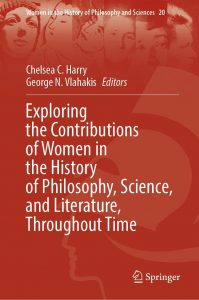 In line with our current New Voices Talk Series: Fertility, Maternity, Reproduction: Women’s Ideas in the History of Medicine, the Summer Term Talk Series 2025, organized by Dr. Jil Muller, Deputy of the Center for the History of Women Philosophers and Scientists, and Dr. Fabrizio Bigotti, Director of the Center for the Study of Medicine and the Body in the Renaissance, is dedicated this semester to Women’s Ideas in the History of Medicine.
In line with our current New Voices Talk Series: Fertility, Maternity, Reproduction: Women’s Ideas in the History of Medicine, the Summer Term Talk Series 2025, organized by Dr. Jil Muller, Deputy of the Center for the History of Women Philosophers and Scientists, and Dr. Fabrizio Bigotti, Director of the Center for the Study of Medicine and the Body in the Renaissance, is dedicated this semester to Women’s Ideas in the History of Medicine.
In this context, we would like to present a contribution from our Springer series “Women in the History of Philosophy and Sciences”, which shows how feminist movements critically reflect on medical knowledge, reclaim it and make it accessible and meaningful for society:
Evangelia Chordaki and Antigoni Lazopoulou:
Reclaiming Our Health: Greek Feminist Birth Control Movements as a Form of Women’s Engagement with Science
Abstract: Between 1976 and 1986, feminist birth control movements emerged within the Greek public sphere. Informed by the second wave of feminism, the activists involved questioned both the dominant medical knowledge by emphasizing its masculine character, as well as the various relevant decision-making processes. Thus, different social groups, by developing their own experience-based expertise, approached the issues of abortion and contraception in two distinct ways: on the one hand, autonomous feminist groups used it as a gateway both for their involvement in Obstetrics and Gynecology (OB/GYN) practices and their engagement in medical knowledge by focusing on their experiences, needs and desires, and their self-education and self-organization, while on the other hand, women’s associations and organizations perceived it as a chance to participate in the policy making process. By approaching Greek feminist birth control movements as boundary movements capable of operating both inside and outside the boundaries of science, we will examine women’s efforts to reclaim their active role in birth control. Moreover, within the framework of science communication, we will explore such movements as examples of the relationship between science and society. We will argue that the history of feminist birth control movements can be re-examined as a history of an alternative form of knowledge that correlates women with scientific ideas and practice and, moreover, science with the public. We will not only elucidate the complexity of the scientific phenomenon, but also we will highlight the presence of women in science in terms of the production and circulation of knowledge.
Interested? The full article can be read in our Springer book series:
Exploring the contributions of women in the history of philosophy, science and literature through the ages
➡️ To the publication
You cannot copy content of this page








